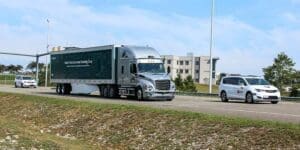 Ah yes, it is officially palindrome week. This year, however, palindrome week takes on a whole new significance. After next Thursday (9/19/19), there will not be an official palindrome week until 2021 (we don’t count putting a 0 in front of the month around here). This is the end of a wonderful run of years, starting in 2011, where the dates read the same frontwards and backwards for a week+. And to quote one off my all-time favorite recording artists, Weird Al Yankovic, “I, man, am Regal, a German am I. Never odd or even. If I had a Hi-Fi. Madam, I’m Adam. Too hot to hoot. No lemon no melon. Too bad I hid a boot. Lisa Bonet ate no basil. Warsaw was raw. Was it a car or a cat I saw? Go hang a salami, I’m a lasagna hog.” And now, on to this week’s logistics news.
Ah yes, it is officially palindrome week. This year, however, palindrome week takes on a whole new significance. After next Thursday (9/19/19), there will not be an official palindrome week until 2021 (we don’t count putting a 0 in front of the month around here). This is the end of a wonderful run of years, starting in 2011, where the dates read the same frontwards and backwards for a week+. And to quote one off my all-time favorite recording artists, Weird Al Yankovic, “I, man, am Regal, a German am I. Never odd or even. If I had a Hi-Fi. Madam, I’m Adam. Too hot to hoot. No lemon no melon. Too bad I hid a boot. Lisa Bonet ate no basil. Warsaw was raw. Was it a car or a cat I saw? Go hang a salami, I’m a lasagna hog.” And now, on to this week’s logistics news.
- UK retailers bristle at demands of no-deal Brexit
- Daimler starts highway test of autonomous freightliner truck
- Amazon in the news:
- FedEx now delivering 60 percent of Walmart packages
- Shopify to acquire 6 River Systems
- Intermodal chassis tariff divides truckers, US manufacturers
- Deliveryman stole $90,000 worth of cakes in New York
 Brexit is looming…again. And once again, the British government is advising supermarkets to stockpile goods as the deadline approaches. This time however, supermarkets are pushing back. Supermarkets have reportedly told government officials that they cannot be blamed if people cannot find everything they want on their shelves. And after two Brexit stockpiles, supermarkets are not prepared to spend hundreds of millions of pounds on supplies should the UK leave the EU without a deal. Supermarkets are also warning that fresh food cannot be stockpiled, so there is only so much they can do. The timing of Brexit is also problematic for food retailers as the holiday rush will surely complicate matters. Either way, these companies are not going to stock up given the uncertainty surrounding Brexit once again.
Brexit is looming…again. And once again, the British government is advising supermarkets to stockpile goods as the deadline approaches. This time however, supermarkets are pushing back. Supermarkets have reportedly told government officials that they cannot be blamed if people cannot find everything they want on their shelves. And after two Brexit stockpiles, supermarkets are not prepared to spend hundreds of millions of pounds on supplies should the UK leave the EU without a deal. Supermarkets are also warning that fresh food cannot be stockpiled, so there is only so much they can do. The timing of Brexit is also problematic for food retailers as the holiday rush will surely complicate matters. Either way, these companies are not going to stock up given the uncertainty surrounding Brexit once again.
 Autonomous trucks continue to drive intrigue, investment, and questions as to when they will fully take over the road. Daimler has started official tests of its autonomous Freightliner trucks on highways in Virginia. For this test, Daimler has stationed a licensed safety driver in the cab; there is also an engineer to monitor the system. But, barring a catastrophic meltdown, Daimler expects the robotic truck to operate on its own. This test is the latest version for Daimler and Torc Robotics, which had previously tested the truck for months on a closed-loop track. This test is what’s known as a Level 4 test, the penultimate level of the autonomous driving scale (Level 0 through Level 5) established by the Society of Automotive Engineers and endorsed by the National Highway Traffic Safety Administration. Level 4 autonomy denotes vehicles that can drive themselves in on-road traffic, within a specified set of operational conditions. Although back-up drivers are on board Level 4 vehicles, there is no expectation that a human will need to intervene in the truck’s operation at this level.
Autonomous trucks continue to drive intrigue, investment, and questions as to when they will fully take over the road. Daimler has started official tests of its autonomous Freightliner trucks on highways in Virginia. For this test, Daimler has stationed a licensed safety driver in the cab; there is also an engineer to monitor the system. But, barring a catastrophic meltdown, Daimler expects the robotic truck to operate on its own. This test is the latest version for Daimler and Torc Robotics, which had previously tested the truck for months on a closed-loop track. This test is what’s known as a Level 4 test, the penultimate level of the autonomous driving scale (Level 0 through Level 5) established by the Society of Automotive Engineers and endorsed by the National Highway Traffic Safety Administration. Level 4 autonomy denotes vehicles that can drive themselves in on-road traffic, within a specified set of operational conditions. Although back-up drivers are on board Level 4 vehicles, there is no expectation that a human will need to intervene in the truck’s operation at this level.
 Amazon has opened a number of Amazon Go stores, its “check-out free” convenience store, in a number of locations around the US. In its effort to control more of the overall shopping and shipping experience, Amazon announced that it is now accepting returns on purchases made online in its some of its Amazon Go stores. To make a return, Amazon customers select the product they’d like to return in the Amazon app and select an Amazon Go store. Then, the customer receives a QR code in the app or via email. An Amazon Go employee scans the code and the return is processed. The process is free and doesn’t require any packaging or boxes, which helps to cut down on cost for Amazon. This is just the latest example of Amazon taking more control over the returns process.
Amazon has opened a number of Amazon Go stores, its “check-out free” convenience store, in a number of locations around the US. In its effort to control more of the overall shopping and shipping experience, Amazon announced that it is now accepting returns on purchases made online in its some of its Amazon Go stores. To make a return, Amazon customers select the product they’d like to return in the Amazon app and select an Amazon Go store. Then, the customer receives a QR code in the app or via email. An Amazon Go employee scans the code and the return is processed. The process is free and doesn’t require any packaging or boxes, which helps to cut down on cost for Amazon. This is just the latest example of Amazon taking more control over the returns process.
Amazon, as we have mentioned here numerous times, is doing everything in its ability to take over the logistics space. This has meant moving into new modes, such as securing capacity on ships from China, leasing and branding cargo planes, and launching a branded final mile delivery service. One area that has been overlooked has been rail. Well, the wait is over. The company recently purchased 250, 53-ft-long freight containers for rail and is now executing a pilot program on the West Coast. The objective is to eliminate intermodal “middle men” and to form a direct-to-rail operation. The Amazon freight containers will only be used in the US in the coming months, but the plan is to also use them on ocean vessels. Somehow, I feel like it’s only a matter of time before we see Amazon freight trains rolling down the tracks.
 When FedEx cut ties with Amazon, on both an air and ground service, it left many people scratching their heads. Well, maybe not. The rationale was that Amazon was looking to take more control (see story above) of the overall logistics space, and FedEx would be better off servicing its other customers. This is tied to the fact that Amazon accounts for less than 2 percent of FedEx’s revenue and that FedEx now delivers nearly 60 percent of all of Walmart orders. This also enables FedEx to focus on more retailers to build out delivery networks. According to Brie Carere, FedEx’s chief marketing and communications officer, “we see a world in 2026 where the market will be 100 million pieces a day, driven by e-commerce. And it’s really important to remember that that’s driven by e-commerce as a broad market, not by any single player.”
When FedEx cut ties with Amazon, on both an air and ground service, it left many people scratching their heads. Well, maybe not. The rationale was that Amazon was looking to take more control (see story above) of the overall logistics space, and FedEx would be better off servicing its other customers. This is tied to the fact that Amazon accounts for less than 2 percent of FedEx’s revenue and that FedEx now delivers nearly 60 percent of all of Walmart orders. This also enables FedEx to focus on more retailers to build out delivery networks. According to Brie Carere, FedEx’s chief marketing and communications officer, “we see a world in 2026 where the market will be 100 million pieces a day, driven by e-commerce. And it’s really important to remember that that’s driven by e-commerce as a broad market, not by any single player.”
Autonomous mobile robots have clearly taken their place in the warehouse and the store. To that end, companies like 6 River Systems, and its robot Chuck (plus a cloud-based software solution that intelligently groups orders together to maximize task density and optimize worker productivity), are reshaping the future of warehouses. Shopify, a leading multi-channel commerce platform, announced that it has reached an agreement to acquire 6 River Systems for $450 million. This is a tough acquisition to analyze. On the surface, it looks like a $450 million investment on a company with expected bookings of $30 million in the next year. At the same time, it looks like a strategy that understands the importance of robotics in the warehouse over the next few decades. We will certainly keep a close eye on this one.
The trade war with China continues to take its toll. A tariff exclusion request for intermodal chassis from China has been welcomed by U.S. fleets and leasing companies, but the request is pitting some US trailer manufacturers against the biggest chassis builder in the industry. Some 43,000 chassis for the US market came from CIMC Intermodal Equipment, the US arm of China International Marine Containers Group Ltd., the largest shipping equipment supplier in the world. Many CIMC-IE chassis models are completed in China and shipped directly to US customers, while other models are assembled in the US from kits shipped from China. All are subject to a 25 percent percent tariff set to rise to 30 percent in October.
And finally, you can never be too careful when it comes to last mile deliveries. To prove that point, a story has broken that a deliveryman for a renowned New York bakery allegedly stole 1,020 gourmet cakes worth nearly $90,000. Over the course of several months, the deliveryman stole cakes from Lady M Confections’ warehouse in Long Island City. Lady M is known for its unique cakes made of stacks of crepes and sell for up to $90 apiece. The deliveryman was caught on camera dozens of times from last November to February nabbing the valuable pastries. In January alone, he allegedly stole 357 cakes worth $31,238, the lawsuit says per the Post. The suit also alleges the deliveryman sold the cakes to other vendors.
That’s all for this week. Enjoy the weekend and the song of the week, Bob by Al Yankovic.
















